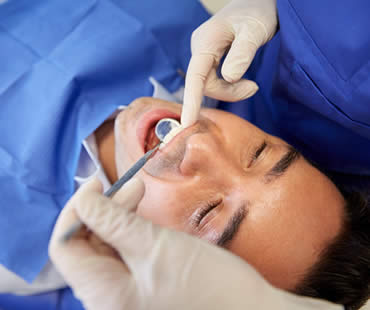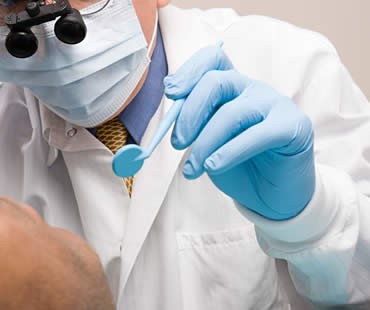
Intravenous, or IV, dental sedation offers patients a way to remain completely relaxed while undergoing dental procedures. Those with dental phobias, severe anxiety, special needs, or other issues are able to obtain necessary treatment instead of avoiding trips to the dentist. IV sedation is an effective and safe process that makes you very relaxed and unaware of the dental work being done. You won’t even remember anything about treatment, allowing you to come away with a positive experience.
Becoming a candidate:
IV medications are delivered directly into your vein through a needle in your arm. You’ll need to schedule an appointment to discuss sedation with your dentist, and disclose any medical conditions and medications (both prescription and over-the-counter) you are taking. A thorough examination will be conducted, X-rays or other tests may be performed, and a discussion of all aspects of IV sedation is necessary to determine if this treatment is right for you.
Going to your appointment:
Arrange for a friend to drive you to and from your appointment, because you may feel drowsy at first. It is advised not to drive, return to work or school, or make important decisions for a day following sedation so that the medication has time to completely wear off. In some cases, your dentist may give instructions for fasting prior to your procedure.
During your procedure:
Qualified, well-trained professionals will be doing your anesthesia and procedure. You will be monitored the entire time to ensure your safety and comfort. The IV will be placed in your arm, and some patients request an additional method of mild sedation be used if needles are upsetting. When the dental work is complete, the sedation will be reversed and you will become more alert to go home.
Recovering from your appointment:
Follow all of the instructions from your dentist about after-care, which will vary depending upon your procedure. Any grogginess you might feel from the sedation usually wears off after a few hours, so plan on resting before returning to your normal routine.
If you need a dentist in Longview contact us today

Sedation dentistry, also known as “sleep dentistry,” refers to the practice of calming and relaxing a patient prior to a dental procedure with the use of pharmacological agents. Sedation dentistry began in the late 1700s when a chemist named Humphry Davy began experimenting with inhaled gasses and first observed the analgesic effects of nitrous oxide, commonly known as “laughing gas,” on himself and on dental patients.
In 1844, an American dentist named Horace Wells used nitrous oxide as a dental anesthetic during the extraction of his own molar tooth. Wells made the observation that while he experienced very little pain while undergoing the extraction, he was still fully conscious during the procedure. A few years later, dentist William Morton and surgeon John Warren performed a public oral surgery at Harvard University, demonstrating the analgesic properties of a sulfur-ether compound, further proving that sedation dentistry should be explored further.
For years, trial and error procedures informed doctors of the safety of various levels of pain-relieving gasses. It was discovered that 100% nitrous oxide, when used in prolonged dental cases, could lead to hypoxia, a condition in which the body is deprived of the oxygen it needs to thrive, something that can eventually lead to death. Finally, a Chicago surgeon named Dr. Edmund Andrews began mixing nitrous oxide with oxygen, administering them simultaneously. This allowed for safer analgesic options for both surgical and dental procedures. Ether and chloroform, combined with some nitrous oxide, was later shown to provide deeper sedation for prolonged treatments.
Intravenous (IV) sedation began in the 1960s at the Loma Linda University School of Dentistry in California. Dentists there experimented with IV sedation for the highest level of management for pain, anxiety and fear for dental patients undergoing surgery.
Today, dentists routinely turn to sedation dentistry for their patients to relieve pain, stress and to provide the most comfortable dental therapies as possible. Talk to your dentist to discover the latest sedation dentistry options and to see how they can help you positively experience your next dental procedure.
If you need a dentist in Longview contact us today

Nitrous oxide, otherwise known as laughing or happy gas, is a colorless and odorless gas that you inhale through your nose. The effects of nitrous oxide are a relaxed feeling and diminished pain, making it an ideal sedation option for many dental procedures. Advantages of sedation utilizing nitrous oxide include:
- The effects of nitrous oxide make their way to the brain in mere seconds, and the pain relieving properties develop in just minutes.
- Your sedation dentist can alter the level of sedation during treatment.
- Nitrous oxide can be administered for the exact amount of time it is needed to complete the procedure.
- Nitrous oxide has no negative after-effects because it is eliminated from the body within five minutes after the sedation is stopped.
- Your sedation dentist has complete control and is able to give incremental doses of nitrous oxide, eliminating the risk of accidentally overdosing.
- No injection is required, making nitrous oxide a very attractive option for patients with a fear of needles.
- The relaxing effects of sedation with nitrous oxide is known to eliminate or reduce gagging.
- Sedation with nitrous oxide is considered very safe and has no negative effects on other organs of the body.
There are a few potential disadvantages of sedation with nitrous oxide, including:
- Some patients may not achieve the desired level of sedation with the maximum amounts of nitrous oxide allowed.
- Patients who are mouth breathers, have claustrophobia, or have difficulty breathing through their nose may not be good candidates for nitrous oxide.
- If you are prone to nausea or a sensitive stomach, nitrous oxide may not be a good option.
If you need a dentist in Longview contact us today

Sedation dentistry is often hailed as a solution to all of a patient’s problems regarding dental therapies. It can address anxiety, fear, stress and pain. It can provide a comfortable experience for the dental patient, allowing the dental professional to work safely and quickly. As with any pharmacological agent, there are risks, and before you agree to any sedation dentistry option, it is smart to educate yourself about some of those risks.
While single doses of oral sedatives such as Valium or Halcion are unlikely to harm a patient, there are concerns regarding multiple doses of these drugs that could potentially cause a patient to be overly sedated, or even completely unconscious. Because each patient has a different metabolism, drugs can take between twenty minutes and an hour to become fully effective.
These time-delay issues are not problematic for inhaled sedation or for IV sedation, as these types of sedation dentistry are effective almost instantaneously. For oral sedation, however, a dentist who administers more than one pill could cause an overdose if the medicine kicks in at the same time. Most dentists lack both the equipment and the training to effectively and quickly address an overdose in a patient who is unconscious.
In 2000, a group known as the Dental Organization for Conscious Sedation was launched. Its purpose is to train dentists on sedation dentistry methods such as how to properly monitor a patient during a dental procedure to ensure that their heart rates and oxygen levels are healthy. Despite this, there are still concerns about adverse effects of adults with oral conscious sedation. There have been no reported adult deaths from overdosing; however, some children have died from oral sedation, leading to the practice being recommended only for adults.
If you are about to undergo a prolonged dental procedure, or if you are considering sedation dentistry to address personal anxiety or a dental phobia, look for a dentist who has received training in sedation dentistry and has high levels of experience to ensure that your procedure is as safe and comfortable as possible.
Our dental office is located in Longview

Severe dental phobia can cause people to completely avoid dental examinations and treatments. Anxiety about dental treatment can develop for many reasons, including fear of pain, the feeling of not having control, fear of needles, a strong gag reflex, or a history of bad dental experiences. If you suffer from extreme dental fears causing you to neglect necessary oral care, sedation dentistry may be the answer to your problem.
A trained sedation dentist can offer a variety of options to address your situation:
- Minimal sedation in the form of nitrous oxide allows you to be awake but relaxed during dental treatment and may be a good option for cleanings, routine examinations, or minor procedures. Your dentist is able to control the amount of sedation you receive.
- Oral conscious sedation also allows you to remain awake during procedures, but may cause you to feel drowsy and will keep you from having much memory of the treatment. A stronger dose can be given to produce more moderate sedation, in which case you may fall asleep but can easily be awakened.
- IV sedation is when a sedative drug is administered through a vein. This type of sedation works rapidly and also allows your dental professional to adjust the level of sedation during treatment.
- General anesthesia provides deep sedation through medications administered that cause nearly complete or total unconsciousness. With general anesthesia you cannot be awakened until the effects of the drugs have dissipated.
Sedation dentistry can be used for any type of dental procedure, from routine cleanings to more complicated, invasive procedures. Thanks to advances in sedation dentistry, you no longer have to fear the dentist and avoid necessary oral health care.
If you live in the Longview area contact us today

Any type of phobia can be a difficult and often frightening condition, but fear of the dentist can be one of the worst because it can ultimately even be deadly. Proper dental care is vital to a healthy mouth and body. People who neglect going to the dentist for treatment are putting their health at risk, but sedation dentistry offers them a way to get the care they need to maintain better health.
Dental sedation involves administering certain types of drugs, from mild to stronger medications, to help a patient relax. The effects of the drugs decrease anxiety and awareness of the specifics related to treatment, so that procedures can be performed without upsetting the patient. Pain is also diminished so that the patient is comfortable during the dental visit.
Sedation methods vary according to the patient and the treatment. The medication may be given as pills that are swallowed orally, nitrous oxide gas that is inhaled through a mask, or medication given intravenously directly into the vein. Often, local anesthetics might still be required but the patient is already under the effects of sedation and does not feel the injection.
There are a number of benefits provided be sedation dentistry. Patients who otherwise might avoid checkups are able to get preventative care and procedures done without anxiety. They usually don’t remember what happened during treatment, so they come away without negative memories. Patients are also able to sit still during treatment, and for longer periods of time so that multiple procedures may be performed if needed. Lengthy or complex procedures are made possible by using sedation that allows patients to cooperate and not realize how long they are in the dental chair.
Sedation dentistry is a way for patients to obtain necessary dental care without the anxiety or fear that sometimes accompanies it. This can make all the difference in improving some people’s oral and general health.
We treat patients from Longview and the surrounding area









